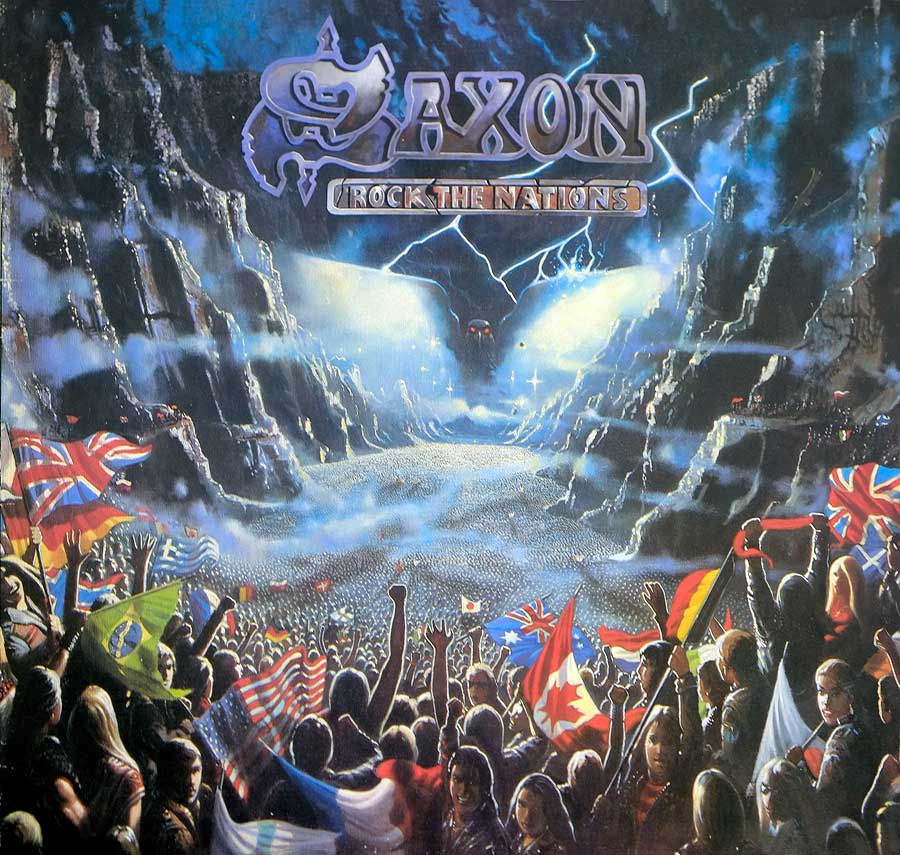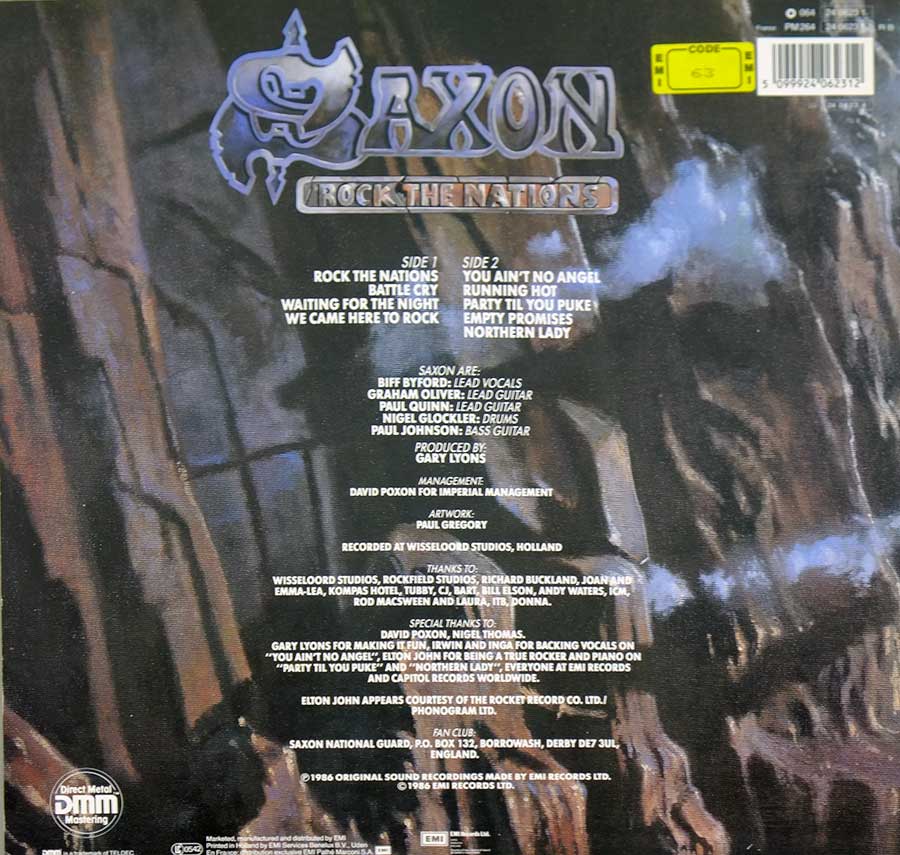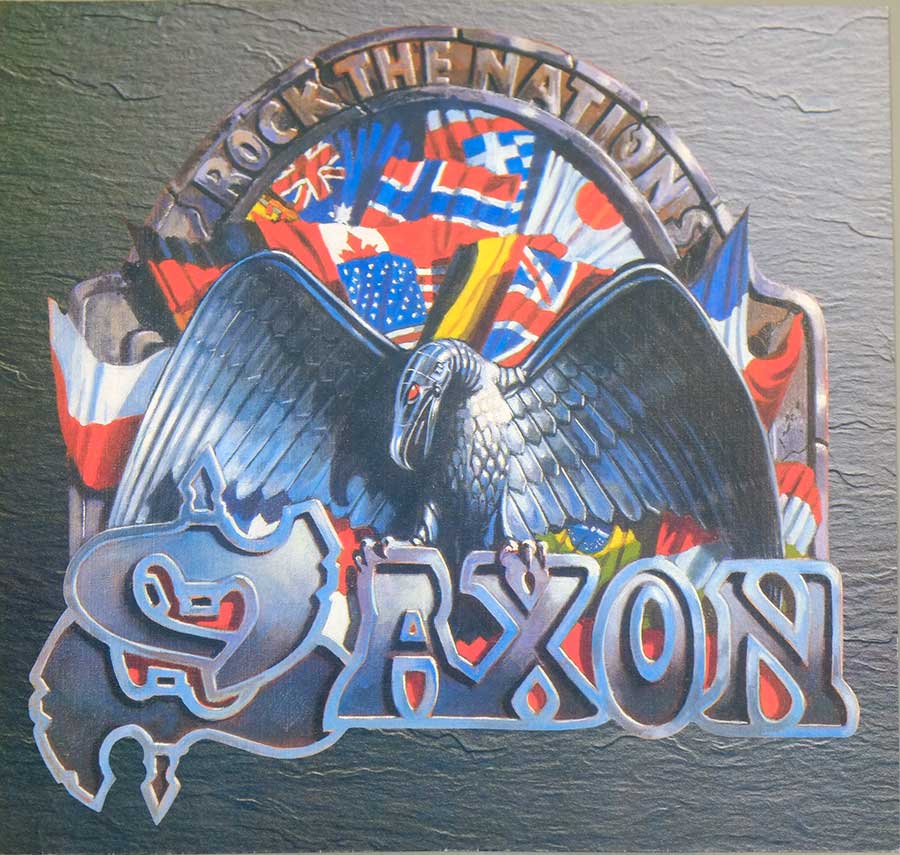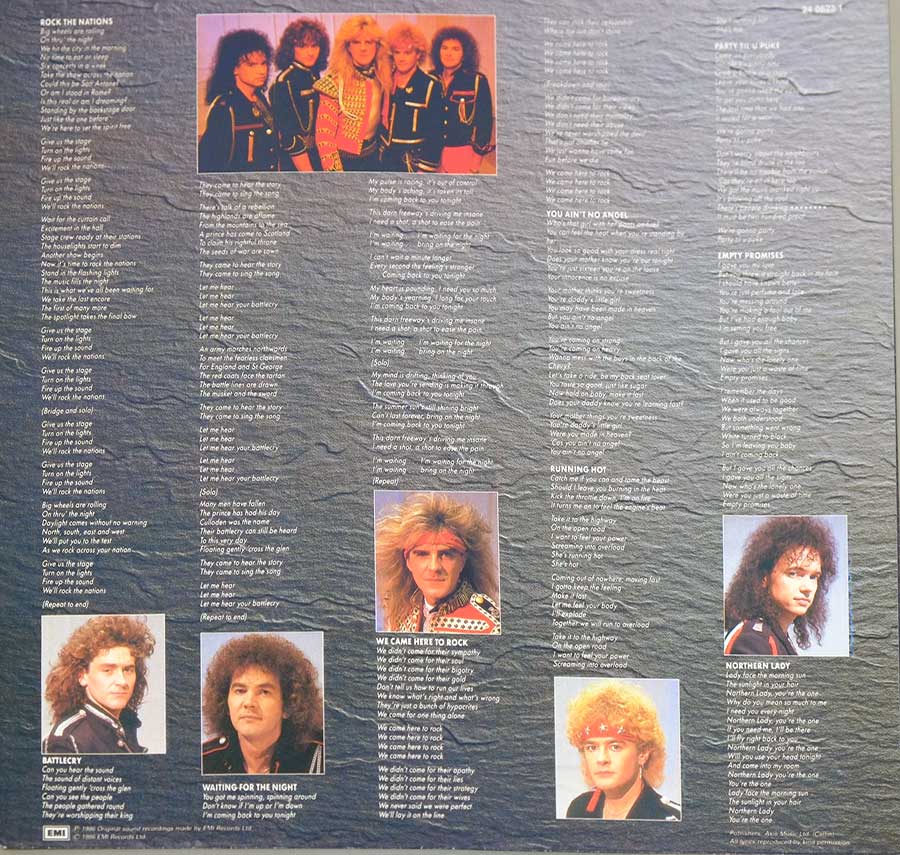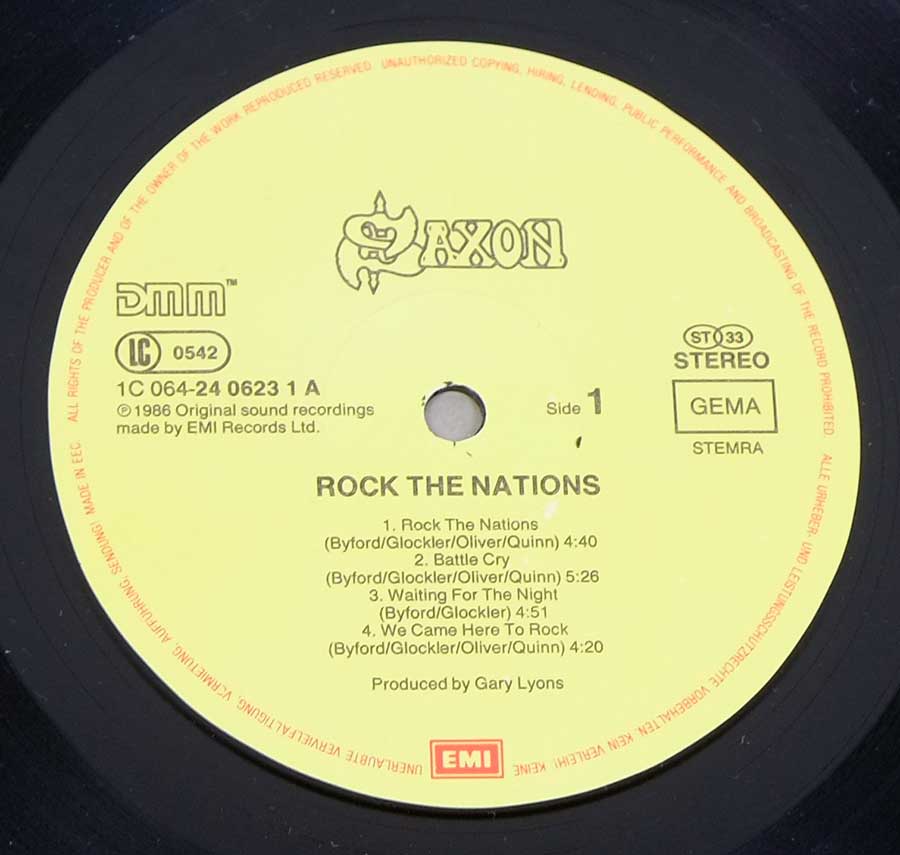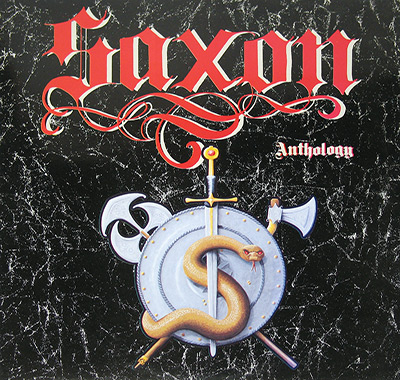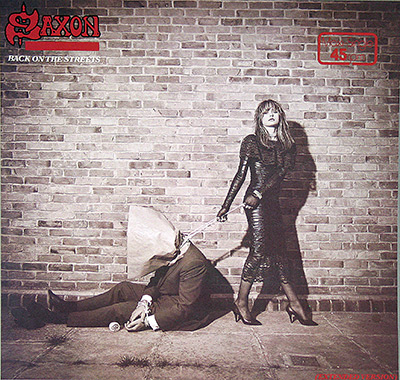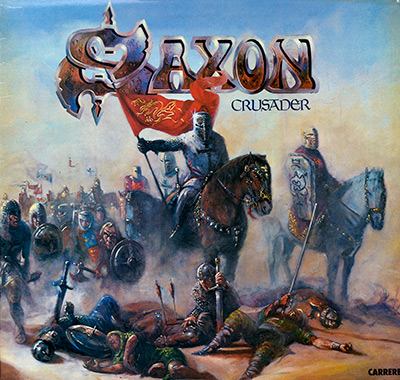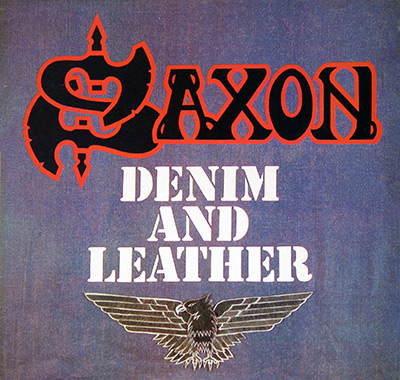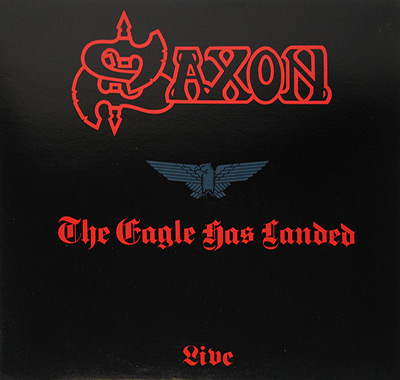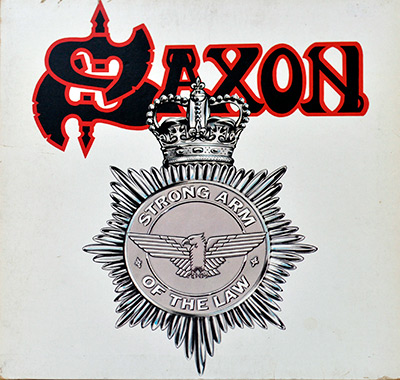"Rock The Nations" Album Description:
In the world of British Heavy Metal history, the New Wave of British Heavy Metal (NWOBHM) movement stands as a pivotal moment, birthing iconic bands that left an indelible mark on the genre. Among these stalwarts, Saxon emerged as a force to be reckoned with, and their 1986 release, "Rock The Nations," remains a testament to the band's prowess and the spirit of the NWOBHM era.
The album, recorded at the esteemed Wisseloord Studios in Hilversum, captures the essence of a time when heavy metal was undergoing a renaissance. The early to mid-1980s witnessed a surge in creativity within the metal community, and Saxon's "Rock The Nations" was a significant contribution to this musical reawakening.
One distinctive feature of this album is the notable guest appearance by the legendary Elton John on a couple of tracks. This unexpected collaboration added a unique layer to Saxon's sound, showcasing the band's willingness to experiment and push boundaries within the heavy metal landscape.
Released as a 12" vinyl LP, "Rock The Nations" not only epitomized the sonic landscape of the NWOBHM movement but also highlighted the enduring appeal of the vinyl format during this period. Vinyl records were the preferred medium for music enthusiasts, offering a tangible connection to the music that surpassed the transient nature of digital formats.
The European release of the album further solidified Saxon's influence on the global metal scene. Europe, with its rich musical heritage, became a thriving ground for the NWOBHM movement, and Saxon's "Rock The Nations" found a receptive audience across the continent.
The production quality of the album, owing to the expertise of Wisseloord Studios, added a level of sophistication to Saxon's raw and energetic sound. Each track, meticulously crafted, showcased the band's musical prowess and lyrical prowess, cementing their status as one of the premier acts of the era.
Band Members and Musicians on: SAXON - Rock The Nations NWOBHM
|
Band-members, Musicians and Performers
- Biff Byford - Vocals, Bass
- Biff Byford – Vocals
Saxon's iron-lung frontman since 1976, still turning choruses into marching orders. Read more... Biff Byford, Saxon's storm-tested voice, is the bloke who can turn a chorus into a pub chant and a battle order in the same breath. I first clock him in the mid-1970s fronting Son of a Bitch, then he takes the wheel when Saxon forms in 1976 and never really lets go. The NWOBHM years are where he stamps the passport: "Wheels of Steel" and "Strong Arm of the Law" (1980) push them into headliner territory, and "Denim and Leather" (1981) seals the tribe. The mid-80s gloss got purists grumbling, but he kept touring and recording through the 1990s. Later he went solo with "School of Hard Knocks" (2020) and formed Heavy Water with his son. He never sang like he was asking permission.
- Graham Oliver - Guitar
- Graham Oliver – Guitar
Saxon co-founder (1976–1995), twin-lead architect, later keeping the flame alive with Oliver/Dawson Saxon. Read more... Graham Oliver, Saxon’s original lead guitarist, is the bloke who made those early twin-lead harmonies feel like two motorbikes racing down the same hill. I remember him from the Son of a Bitch days (mid-1970s), then as a Saxon founder from 1976 to 1995 through the classic NWOBHM punch—“Wheels of Steel” and “Strong Arm of the Law” (1980), “Denim and Leather” (1981)—where his tone stayed bright, sharp, and just a bit reckless. After leaving, the band-name dispute turned into paperwork warfare. From the late 1990s into the 2000s he resurfaced with Oliver/Dawson Saxon, keeping the old songs alive with Steve Dawson. Not tidy. Not polite. Very Oliver.
- Paul Quinn - Guitar
- Paul Quinn – Guitar
Founding Saxon guitarist (1975–present; not touring since 2023) with riffs that hit like a rivet gun. Read more... Paul Quinn is the quiet engine of Saxon, a Barnsley guitarist who helped turn late-70s pub grit into NWOBHM muscle. I first clock him in Son of a Bitch (1975-1978), then in Saxon from 1978 onward, locking riffs with Graham Oliver while Biff Byford barked the orders. The early run hit like a double punch: "Wheels of Steel" and "Strong Arm of the Law" (1980), then "Denim and Leather" (1981) when the scene became a tribe. He kept the machine running through the 80s and into the early 90s, even when labels wanted polish and the fans wanted blood. In 2023 he stepped back from touring; Brian Tatler took the live seat, while Quinn stayed on for studio work. Sensible, sure. Still stings.
- Pete Gill - Drums
- Pete Gill – Drums
I always liked drummers who hit like they mean it, and Gill was built for the job. Read more... Pete Gill, Sheffield drummer with a backbeat like a rivet gun, is the original engine behind Saxon's early charge. I first clock him as one of The Glitter Band's twin drummers (1973), then grinding it out in Son of a Bitch (1977–1979) before the badge changed to Saxon (1979–1981). Those first four studio albums don't breathe without his boots-on-concrete timing—straight, hard, and built for denim-and-leather choruses. A hand injury ended his first Saxon run in 1981, but he didn't fade; he jumped into Motörhead from 1984–1987, recording the new tracks for "No Remorse", the live "The Birthday Party", and the album "Orgasmatron". He returned for one last blast in 1996 with Oliver and Dawson's Son of a Bitch, laying drums on "Victim You".
- Paul Johnson - bass (actually bass guitar was played by Byford before Johnson joined the band)
|
